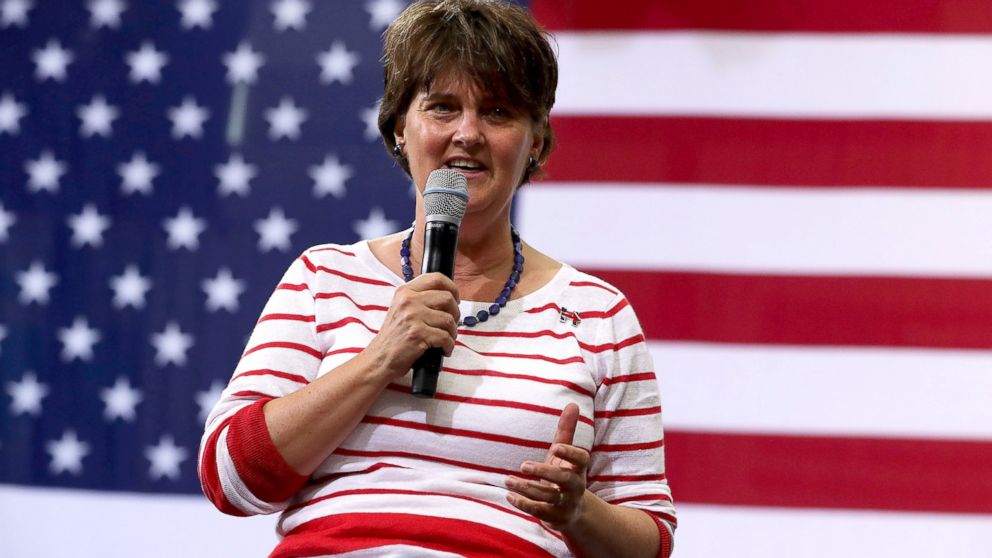How Anne Holton Advocated for Virginia's Foster Youth
Holton resigned as VA's secretary of education after husband's VP nomination.

— -- While Anne Holton may have resigned from her position as Virginia’s secretary of education last month following the selection of her husband, Tim Kaine, as Hillary Clinton’s running mate, she leaves behind a legacy of service for children and foster youth in the state.
“During her tenure, Anne has been a constant and powerful voice for students, teachers and schools,” said Virginia Governor Terry McAuliffe said in a statement following the announcement of her resignation. “Her lifelong dedication to serving Virginia’s young people, especially the children at the margins, has had a lasting impact in the Commonwealth.”
Her lasting impact is manifest in the issues she cared about most as a former juvenile court judge, first lady of Virginia and, most recently, as the state’s secretary of education: child welfare reform and foster care.
After graduating from Princeton University and then Harvard Law School -- where she met her husband and future governor of Virginia -- Holton, 58, served as a U.S. District Court law clerk for a year in Richmond. She later worked as an attorney for the Central Virginia Legal Aid Society and then as a substitute judge for the Juvenile and Domestic Relations District Court. After getting sworn in as a permanent judge in 1998, Holton remained on the bench until 2005.
It was there that Holton was exposed to the problems in Virginia’s child welfare system.
Serving as a judge “gave her the expertise for understanding some of the systemic problems that families and kids were dealing with in Virginia,” said Margaret Nimmo Holland, the executive director of Voices for Virginia’s Children, a nonprofit, nonpartisan research and advocacy organization dedicated to improving child welfare and foster care in Virginia. Anne’s mother, Jinks, was one of the founders of Voices for Virginia’s Children and served on the board of directors. Holton would later follow in her mother’s footsteps by joining the board of directors in 2010.
As the first lady of Virginia from 2006 to 2010, Holton partnered with Voices for Virginia’s Children and multiple child service agencies across the state to launch the Children’s Services System Transformation campaign, which dramatically increased the number of foster children entering permanent family arrangements. She also led the “For Keeps: Families for All Virginia Teens” initiative to secure and strengthen permanent families for older foster care teenagers and young adults.
But her contributions do not stop there. “The work that she spearheaded as Virginia’s first lady with the Children’s Services System Transformation, both in state government and on the ground, and the many child serving organizations, laid the foundation for a policy change called Fostering Futures,” Holland explained.
Fostering Futures focused on providing transition services for foster youth up to 21 years old who were aging out of the traditional foster care system. Virginia joined 30 other states and the District of Columbia in expanding its efforts to help older foster care adolescents.
The bipartisan nature of helping Virginia’s foster youth gained political momentum.
“I think it’s really important that after the Kaine administration, [Gov. Bob] McDonnell made it a priority in the administration to focus on adoption too,” Holland noted. “Bipartisan support in Virginia is crucial to really address this very vulnerable population of kids.”
After leaving the Executive Mansion, Holton continued serving Virginia’s foster youth by becoming the director of Great Expectations in 2013, a program run by the Virginia Foundation for Community College Education that helps foster care students gain access to higher education.
Great Expectations, which began in 2008 with just five of Virginia’s community colleges, has since expanded to 18 community colleges across the Commonwealth.
Holton regularly attended Great Expectations events, including forums and skills-based workshops, as well as graduation ceremonies hosted by the program for students each academic year, according to Rachel Strawn, current director of the Great Expectations program.
“Her presence just means so much to the kids because it shows a high level of support,” explained Strawn.
This high level of support also means a lot to the Great Expectations coaches, who help Virginia’s foster youth navigate the state’s educational system and transition from foster care to the real world. Not only do the program’s coaches offer students educational tools, like academic tutoring and college admissions preparation, but they also provide mentoring in “life skills training” that focuses on finances, job interviews and career exploration.
“Our coaches are just the crucial linchpin into how this system works,” said Holton, then program director, in a 2013 video for Great Expectations. “Really, it’s the combination of emotional and practical support that’s almost in a pseudo-parent role that these coaches are filling in for these young people who don’t have a parent.”
Thomas Wise, who spent 10 years in Virginia’s foster care system, saw Holton speak at an event for the “For Keeps” initiative in 2008 and was immediately drawn to the Great Expectations program.
“It’s nice to have a longstanding connection and network when you need it,” Wise, 25, said. “It’s helped me in school and in my job. It goes beyond schooling.”
With the help of his Great Expectations coach and mentor, Wise graduated from high school in 2010, and even received a personal letter of congratulations from Holton and her husband upon his graduation. Wise later enrolled in the John Tyler Community College, from which he graduated in 2013.
“Great Expectations has had a tremendous impact on my life,” said Wise. “I probably wouldn’t have finished school without it.”
ABC News' Katherine Faulders contributed to this report.




